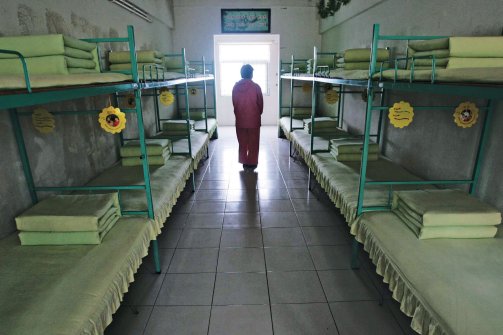China’s Labor Pains
Will China ever reform its prison camps?
The Daily Beast, January 14, 2013 (A reprint of a Newsweek Magazine article)
By Rosemary Righter
On jan. 7, Meng Jianzhu, the recently appointed head of the Communist Party’s Central Politics and Law Commission, made a historic announcement. He informed a legal conference that Mao Zedong’s loathed “reeducation through labor” system, known as laojiao, would be scrapped as soon as the National People’s Congress stamps the reform this March.

Mao thought up laojiao back in 1957—as a way to get rid of his enemies. Police can pick up people and send them without formal charge, legal representation, or trial for up to four years of detention with hard labor. The system serves as a method for “disappearing” into grim labor camps any inconvenient Chinese citizens, prostitutes, petitioners against injustice, members of sects such as Falun Gong, and—in a notorious recent case—a mother demanding heavier sentences for the gang who raped her 11-year-old daughter and sold her into prostitution (the woman was later released). More than 150,000 Chinese suffer in this extralegal hell. No single reform would be more effective for a better China than its abolition.
Yet within hours, Meng’s statement, unmistakable in the official transcript of the meeting, had been “rephrased” in the official media: on the agenda was reform, not termination. Reform could merely lay a veneer of legality over the previously extralegal system. Already, a controversial new law, Article 73, specifically authorizes secret detention of people suspected of crimes related to state security, terrorism, or serious corruption. In what is believed to be the first Article 73 arrest, only hours after Meng spoke, police hauled off a man for daring to question the suspicious death of an activist.
Xi Jinping, China’s smiling new boss, has made his first big mistake. Admittedly he is in a bind. Far from being the “harmonious society” proclaimed by his predecessor, Hu Jintao, China is seething with malcontents, manifested in some 200,000 “mass incidents” a year. Xi is under huge public pressure, not just from the urban young but from very senior party intellectuals, to do more than just talk about reform. But there is equally strong resistance, among party hardliners and also among “realists,” who argue that reforms that genuinely subject the party to the rule of law would end up destroying it—because, almost by definition, the party is a law unto itself.
Xi’s first efforts this autumn were concentrated on the Communist Party’s terrible image problem. He has acknowledged the issues of rampant corruption and of conspicuous abuse of privilege by officials high and low. There is also the disrepute of the public exposures of criminality, including murder, that were deemed necessary to secure the downfall last year of Bo Xilai, the Chongqing party boss who was the darling of China’s neo-Maoist left. Xi has responded with a new anti-corruption campaign, with new rules imposing somewhat more frugal habits on party officials and with encouraging noises about the need for all those in power to observe the rule of law and adhere strictly to China’s Constitution.
The new-year editions of most Chinese newspapers duly carried editorials expounding, in safely general terms, the need for “political courage” in executing reforms. But readers of the widely awaited new-year message ofSouthern Weekly, a respected Guangdong newspaper, were bewildered to find an uncharacteristically bland eulogy of a Xi speech. As it rapidly emerged, the article was the work not of the editors, but of the province’s official censor, who had taken it upon himself to turn the real editorial inside out. The editors had committed the indiscretion of taking seriously Xi’s promises to stamp out wrongdoing in the party and afford citizens the full protection of the Constitution. The censored text of the editorial, which promptly went viral, asserted that only if their constitutional rights were properly guaranteed could “citizens voice their criticism of power loudly and confidently, and only then can every person believe in their hearts they are free to live their own lives.” Once this would have been a local censorship scandal; today it has become a rallying point for Chinese demands for untrammeled debate.
Caught between soft-cop propaganda and tough-cop instincts, Beijing looks ridiculous. Despite Xi’s comfortable speeches, China’s leaders have never been more frightened of change. It shows.
Rosemary Righter is an associate editor at the Times of London.
